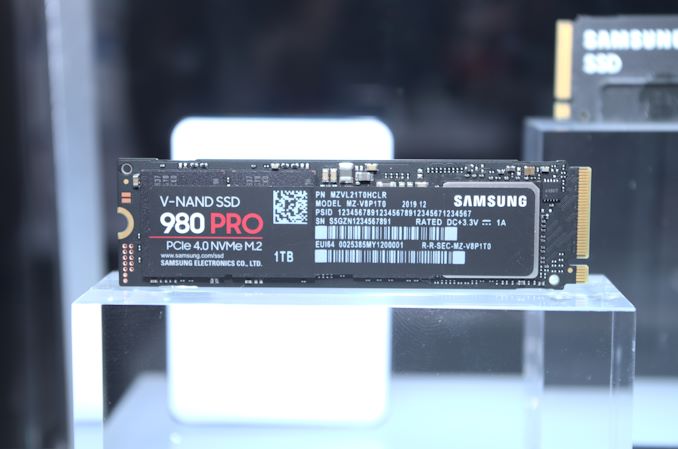Samsung Embraces PCIe 4.0 in Upcoming 980 PRO SSD

As spotted by AnandTech, Samsung is showcasing the new 980 PRO M.2 NVMe SSD at its booth at CES 2020. The upcoming flagship SSD exploits all the goodness that the PCIe 4.0 interface has to offer.
Like previous PRO models, the Samsung 980 PRO adheres to the typical black PCB and M.2 2280 form factor. The addition of PCIe 4.0 support, however, will allow the drive to deliver higher performance than its predecessors.
Samsung rates the 980 PRO 1TB model with sequential read and write speeds up to 6,500 MB/s and 5,000 MB/s, respectively. This would put the 980 PRO ahead of rival PCIe 4.0 SSDs like Corsair's Force MP600 or Gigabyte's Aorus NVMe Gen4 SSD.
| Model | Sequential Read | Sequential Write |
|---|---|---|
| Adata XPG Sage | 7,000 MB/s | 6,000 MB/s |
| Samsung 980 PRO 1TB | 6,500 MB/s | 5,000 MB/s |
| Gigabyte Aorus NVMe Gen4 SSD 1TB | 5,000 MB/s | 4,400 MB/s |
| Sabrent Rocket PCIe 4.0 1TB | 5,000 MB/s | 4,400 MB/s |
| Corsair Force MP600 1TB | 4,950 MB/s | 4,250 MB/s |
The common denominator between current PCIe 4.0 SSDs is the use of Phison's PS5016-E16 SSD controller, which maxes out at 5,000 MB/s reads and 4,400 MB/s writes. The next wave of PCIe 4.0 SSDs should leverage the new PS5018-E18 controller that promises sequential speeds up to 7,000 MB/s and 1 million IOPS.
Innogrit recently jumped into the scene with its Rainier IG5236 SSD controller that offers sequential read and write speeds over 7,000 MB/s and 6,000 MB/s, respectively. Samsung will really need to up its game if the company wants to the 980 PRO to be the fastest PCIe 4.0 SSD on the market.
The Samsung 980 PRO will reportedly be available in 250GB, 500GB and 1TB capacities. That's one more capacity to choose from than before - the previous Samsung 970 PRO only came in 512GB and 1TB flavors.
Samsung didn't specify what type of NAND the 980 PRO uses. Given that the brand's PRO line of SSDs traditionally use MLC (multi-level cell) chips, we don't expect the 980 PRO to break that mold. As a reminder, the Samsung 970 PRO utilizes the company's 2-bit MLC V-NAND. The company might use the same chips on the 980 PRO as well.
Get Tom's Hardware's best news and in-depth reviews, straight to your inbox.

Zhiye Liu is a news editor, memory reviewer, and SSD tester at Tom’s Hardware. Although he loves everything that’s hardware, he has a soft spot for CPUs, GPUs, and RAM.
-
alextheblue ReplyInnogrit recently jumped into the scene with its Rainier IG5236 SSD controller that offers sequential read and write speeds over 7,000 MB/s and 6,000 MB/s, respectively. Samsung will really need to up its game if the company wants to the 980 PRO to be the fastest PCIe 4.0 SSD on the market.
I mean, sequential max speeds are nice and all... but it doesn't directly correspond to real-world performance. So for all we know the 980 Pro will be the fastest (depending on the workload). We won't know until they hit the labs.
As for me I'll be waiting to see how a more affordable "980 Evo" performs. -
Jasonovich Shame it's only X570 and TR HEDT motherboards only, would be nice to see Intel get in on the act.Reply -
kal326 Reply
It's more of a shame when Intel has PCIe 4.0 drives that they can't natively use either.Jasonovich said:Shame it's only X570 and TR HEDT motherboards only, would be nice to see Intel get in on the act. -
hftvhftv Reply
You'll be waiting a year or moreJasonovich said:Shame it's only X570 and TR HEDT motherboards only, would be nice to see Intel get in on the act. -
bit_user Reply
Rocket Lake supposedly has PCIe 4.0 for x16 GPU lanes + x4 NVMe lanes. Perhaps that's what you mean?hftvhftv said:You'll be waiting a year or more -
hannibal No 2tb version? And new even smaller 256gb version instead... interesting direction... this has to be lighning speed or it is out of competition in release!Reply -
bit_user Reply
The higher-capacity drives are QLC, which is also slower. In order to hit the high speeds one would expect of a PCIe 4.0 drive, they are naturally using a lower-density memory, which also means lower capacity.hannibal said:No 2tb version? And new even smaller 256gb version instead... interesting direction... this has to be lighning speed or it is out of competition in release!
According to the article:
Samsung didn't specify what type of NAND the 980 PRO uses. Given that the brand's PRO line of SSDs traditionally use MLC (multi-level cell) chips, we don't expect the 980 PRO to break that mold.
So, that's 2 bits per cell, which is literally half the per-cell capacity you get from "QLC" (which is actually 4 bits per cell - 16 levels, not the 4 suggested by the name). -
USAFRet Reply
Every new technology of SSD has started out with small drives.hannibal said:No 2tb version? And new even smaller 256gb version instead... interesting direction... this has to be lighning speed or it is out of competition in release!
Eventually, size will increase and price per GB will fall.
Eventually. -
USAFRet Reply
And a good bit "slower" than the 980.hannibal said:Corsair p600 use TLC, not QLC in 2tb model.
(if that big sequential number is what we are keying on)